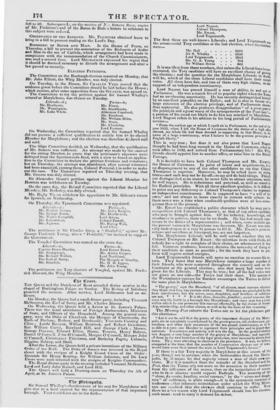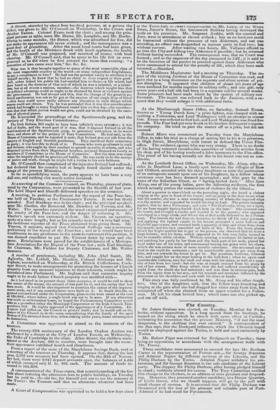rbr itittropolig.
Sir Samuel Whalley's abandonment of his seat for Marylebone will give rise to a hard contest for the representation of that important borough. Four candidates arc in the field—
Lord Nugent, Colonel Thompson, Mr. Ewart, Lord Teignmouth.
The first three are well-known Liberals; and Lord Teignmouth sea the unsuccessful Tory candidate at the last election, when the numbers were—
Mr. Hall
3512 Sir S. Whalley . . . . 3350 Lord Teignmouth . . ; . 2952 Mr. G. A. Young . . . 764 Sir William Horne . . . 662
had an overbearing superiority. He has recently distinguished himself by an excellent pamphlet on the Ballot ; and he is also in favour of* large extension of the elective privilege, and of Parliaments shorter than septennial. He also professes disapprobation" of a great part of the principle and a great many of the arrangements of the Poorlaw,"_ a portion of his creed not likely to do him any mischief in Marylebone, Lord Nugent refers in his address to his long period of Parliamentary service- " From the earliest age at which I could sit in Parliament, to the end of the ..
abroad, my whole life bad been devoted to supporting in that House, in the name of a large constituency, what I believe to be the genuine principle of English liberty."
This is very true ; but does it not also prove that Lord Nugent thought he had been long enough in the House of Commons, when be took office in 1832, and retired from Parliamentary life ? His Whig friends should appoint him to another office, or raise him to the British Peerage.
It is desirable to have both Colonel Thompson and Mr. Ewartin the House of Commons. In point of talent and acquirements, itis no disparagement to any of the other candidates to say that Colonel Thompson is superior. Moreover, he may be relied upon in trying times—and such may not be far off—to say and do bold things. Though not distinguished as an orator, he never fails to attract attention, which he well repays. He is industrious and punctual, as well as stanch in his Radical principles. With all these excellent qualities, it is difficult to point out any deficiency in Colonel Thompson's claims to represent an independent constituency. He is supposed to have di a will of his own," and not always to move exactly in concert with others : but there never was a time when combinable qualities were of less conse. quence than at the present.
Mr. Ewart has established a public character which be may put in competition with Colonel Thompson's, or that of any other candidate
■ vlio may be brought against him. Of his industry, knowledge, and steadiness in politics, there can be no doubt. He has had ample expe- rience in the duties of a representative ; and when, some months ago, the present vacancy in Marylebone was foreseen, Mr. Ewan was mu. rally looked upon as a very tit person to fill it. Mr. Ewart's great ex. editing and sacrifices at Liverpool, too, are not forgotten. The Alarylebotie Liberals will be well served, whether they take Colonel Thompson or Mr. Ewart : the selection rests with them, and nobody has a right to complain of their choice, on whomsoever it may full. Common prudence, however, dictates the necessity of fixing on their candidate as soon as possible ; for the work they have to per. form will require united energies. Lord Teignmouth's friends will spare no exertion to secure his re- turn. They boast that now Marylebone contains a large number of their friends, who were scattered throughout the country arid on the Continent at the general election ; also that many bad votes were given for the Liberals. This may be true ; but all the bad. votes were not given on one side—the Tories had their share. The success of the Westminster canvass for Burdett encourages the Tories to follow the same plan in Marylebone- " The gentry," says the Standard, "of all classes, must canvass wherever they think that they con canvass with success. Noblemen are precluded bylaw from interference, but the wires' sons, daughters, and brothers of noblemen are not. • • • • It is the close, domestic, familiar, social canrass, that must win the battle in a borough like Marylebone ; and every man has a circle within which he can prosecute this canvass effectually, by the claims of friend- ship, relationship, uud other claims, as well as by the force of fair reasoning."
The Morning Post exhorts the Tories not to let the plebeians gale this election-
" Let it nut be said that the gentry of this important district of the Metro. polis are so completely overwhelmed by the green-grocers, old clothes-men, gin. retailers, and other such ornaments of the ten-pound constituency, as to be unable to return one Member to represent their principles and to guard their interests. Earnestness and activity will win the day. At the general election last August, a very large number of the gentry of Marylebone, and especially f those in the two branches of the legal profession, were necessarily absent from town. Thy were attending to elections in the provinces. It was, we believe, computed at the time, that the number of Conservative electors out of town would have more than turned the scale in Load Teignmouth's favour."
If there is a fair Tory majority in Marylebone at this season of the year, though not in autumn, when the fashionables desert the Metro- polis, by all means let that majority return a man of their owe opi- nions. .13 at it is manifest from the remarks of the Standard and the Post, that the Tories rely not more on the accession to their numbers from the difference of the season, than on the intimidation of voters, who in their absence would support Radicals. The meaning of the " close, do nestic, familiar, social canvass," by the " wives and daugh- ters " of noblemen, is plain enough—it is the systematic coercion of tradesmen —that infamous intimidation under which the Whig Minis- ters are resolved that the electors shall continue to suffer. Were there no other reason why Lord Teignmouth should lose his election, such mean used to carry it demand his defeat.
It is manifest from these numbers, that unless the Liberal force ism centrated, the Tory candidate will have an excellent chance of gaieia, the election ; and the question for the Marylebone Liberals to decide will be, which of the three Liberal candidates shall have their united votes. All three have fair, and two of them very high claims, on the support of an independent constituency.
Lord Nugent has proved himself a man of ability, in and out of Parliament. He was a stanch friend to popular rights when the Tories
year 1832, when I left the House of Commons for the duties of a high office A dinner, attended by about four hundred persons, at a guinea the ticket, was given to Mr. O'Connell on Wednesday, in the Crown and Anchor Tavern. Colonel Evans took the chair ; and among the prin. cipal persons at table, were Mr. Hume, Mr. Langdale, and Mr. Roche.
Owing to some mistake, the dinner, which was advertised for five, did not make its appearance till seven o'clock ; and the consequence was a good deal of grumbling. After the usual loyal toasts had been given,
and the health of the Ministers drunk with much applause, the health of Mr. O'Connell was proposed, and received of course with loud
cheering. Mr. O'Connell said, that he never in his life felt so over- powered as he did when he first entered the room that evening: "a sensation of awe came over him," &c. &c.
What was it that brought together so many of the most respectable class of the roost respectable country in the world—so many independent Englishmen,
to pay a compliment to him? He had not the personal vanity to attribute it to himself merely; he knew that he had no claim to their respect or their good- will, unless indeed his public life had entitled him to them—a life which had been based on the doctrine of that sect of which he was a talented, or a talent-
less, but at all events a zealous, member—the doctrine which taught bin, that no political advantage could or ought to be obtained by force or violence against
the government. He had always said this, that the change of the greatest po- litical amelioration was not to be got at the expense of one single drop of blood _.that force could never really achieve any alteration in such things which
reason could not obtain. Yes, he was persuaded that it was this consideration which had brought so many Englishmen round him on that day—the considera. tion that that which justice would not give, could not be obtained by the exer- cise of physical power. He denounced the proceedings of the Spottiswoode gang, and the perjury of Tory Election Committees—
The Irish Reform Bill ought to have been infinitely more extensive ; it was full of faults, and the worst part of it was, that it exposed Ireland to all the machinations of the Spottiswomle gang, to pecuniary corruption in its worst form, and above all to the perjury of Tory Committees. lie had said, in the House of Commons, and he repeated it now, that Ireland was not safe from the perjury of English and Scottish gentlemen. They sacrificed their conscience to party; it was horrible to think of it. Persons who were gentlemen in rank and fortune, who ought by their conduct to preach morality to others, and who dispensed justice from their Magisterial benches, perjured themselves hourly as members of Committees in the House of Commons. But the time was come when the iniquity should be proclaimed boldly. He was ready to be the martyr of justice and truth, though he might fall a victim to his own boldness.
Mr. O'Connell then complained of the injustice Ireland had suffered ; but declared that his country had at length found shelter under the wings of the present Ministers.
So far as speechifying went, the party appears to have been a very dull one, and nothing else worth notice occurred.



























 Previous page
Previous page